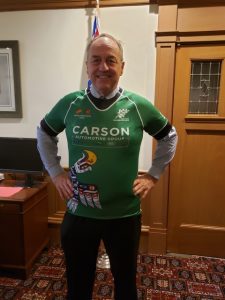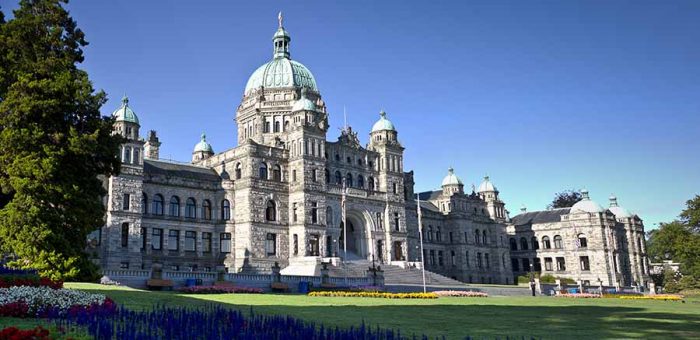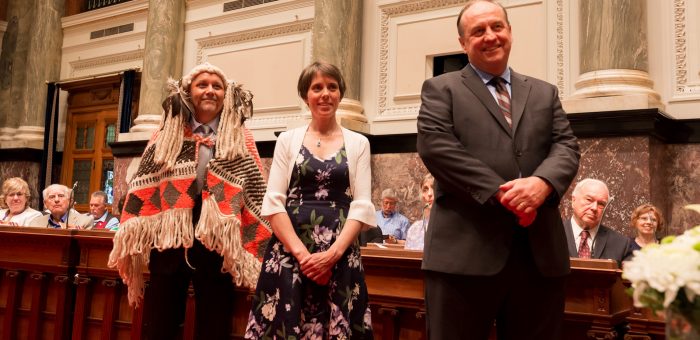Issues Blog
Weaver to step aside from BC Green Caucus to sit as an independent
Today, I announced that effective Monday, January 20 I will sit as an independent MLA in the BC Legislature. As the BC Green leadership race unfolds, I believe that it is important for the BC Green Party to develop a new vision and voice independent from mine. My presence in the BC Green caucus could hinder that independence. Sitting as an independent will also give me a better opportunity during the upcoming legislative sitting to attend to personal matters, including a number of health challenges affecting my family.
Below I reproduce my office’s press release.
Media Release
Weaver to step aside from BC Green Caucus to sit as an independent
For Immediate Release
January 15, 2020
Victoria, B.C. – Andrew Weaver, Oak Bay Gordon Head MLA, today announced he will leave the BC Green Caucus and sit in the legislature as an independent, effective Monday, January 20.
“Over the last few months I’ve spent a good deal of time thinking about how best to balance my commitments under the Confidence and Supply Agreement (CASA), my desire to see the BC Green Party grow its political presence in British Columbia and increasing health demands affecting my family”, Weaver said. “After careful consideration I feel it is best for all parties if I continue my legislative work as an independent member, prior to the beginning of the spring legislative session.”
“As the leadership race unfolds, I believe that it is important for the BC Green Party to develop a new vision and voice independent from mine. My presence in the BC Green caucus could hinder that independence” Weaver said. “Sitting as an independent will also give me a better opportunity during the upcoming legislative sitting to attend to personal matters, including a number of health challenges affecting my family.”
Weaver also announced today he will return to the University of Victoria to resume his academic duties upon completing his term as an MLA.
“I’m excited about the prospect of eventually getting back to the classroom”, Weaver said. “I entered politics to have a positive impact on the political discourse on climate change, and I am very proud of the accomplishments of the BC Greens under my leadership. I look forward to watching their continued growth under the party’s new leader.”
-30-
Media Contact:
Judy Fainstein, Director of Operations
Office of Andrew Weaver, MLA
Phone: (250) 472-8528
Judy.Fainstein@leg.bc.ca
Stepping down as leader of the B.C. Green party in January
Today after Question Period in the legislature I held a brief press conference to note that as the BC Green Party prepares to choose a new Leader, I will be stepping back from my role on the first day of the upcoming leadership contest, expected to begin in early to mid-January. This will allow an interim leader to carry our party through the race. Today’s announcement follows my earlier pronouncement that I would not be seeking reelection.
I want to ensure that the focus is on the new leadership candidates and the vision they bring forward to carry on our important work. I am very proud of the work that we have accomplished – with new legislated climate targets and nearly $1 billion committed to implement CleanBC, and I will continue to serve as MLA and support the Confidence and Supply Agreement while holding the government to account to make sure we stay on track with CleanBC and with building the emerging economy.
The Provincial Council for the BC Green Party Provincial Council is currently considering the rules and timing of the leadership race, and will select an interim leader to serve as a caretaker through this period.
Below I reproduce my speaking notes and the press release that was issued.
Speaking Notes
I have asked you here today because I have concluded that, with the passage of the Climate Accountability Amendment Act, the BC Green Party has achieved what I set out to do: embed climate action goals and accountability into the very legislative fabric of British Columbia. With its passage, this province has both the roadmap to meet our targets, and the accountability and transparency measures in place to report on its progress. It now comes down to the choices this and successive government’s make as to whether we seize the opportunity in front of us to build a clean economy.
Over these many years as MLA, I have given everything I have to this work, and am proud to have done so. The work has not been restricted to climate alone. Notably, my last private member’s bill honoured all those lost in Holodomor, and Saturday’s inaugural recognition BC’s Ukrainian Famine and Genocide Memorial Day was of deep personal significance for my family. Bringing the parties together on this legislation was a highlight of my career and my life.
And now it is time for me to step aside, to make way for others. I have said before that politicians should enter with clear agendas and leave once they have accomplished them. I am a man who believes in leading by example.
And so…I will be stepping down as leader of the B.C. Green Party in January so to coincide with the start of the launch of the leadership contest. Stepping aside as leader at the start of the leadership contest allows me to offer more support and provides more space for a strong, vibrant race.
I feel a deep pride for the role the BC Greens have played in getting the province back on track to meet its climate commitments and to reframe climate change as an economic opportunity – instead of a purely environmental issue. The momentum within the BC Green Party gives me peace of mind as I turn the reins over to future Green leaders.
I am eager to begin the next chapter in my career and am proud to step aside and make way for the new people, ideas, and energy that are critical to moving the province forward for the well-being of all British Columbians.
Media Release
B.C. Green leader Andrew Weaver to step down in January
For immediate release
Wed. Nov. 27, 2019
VICTORIA B.C. – B.C. Green Party leader Andrew Weaver has announced that his resignation as leader of the party will take effect on the first day of the upcoming leadership contest, expected to begin in early to mid-January.
“This session has become a fitting conclusion to my time as leader,” Weaver said. “From the Climate Accountability Amendment Act to the Declaration on the Rights of Indigenous Peoples Act, our party has worked collaboratively to fulfill many core aspects of our vision. I have also had the distinct honour of passing the Ukrainian Famine and Genocide (Holodomor) Memorial Day Act, which is of particular personal significance.
“This makes the start of the leadership contest an appropriate time to let the party begin a new chapter. It presents an exciting time for the next generation to lead. I look forward to supporting this new period of the party’s history.”
An interim leader will be appointed by the party’s Provincial Council at its next meeting, and announced by Fri. Dec. 6, 2019. The interim leader’s term will begin and end with the leadership contest, from early to mid-January to June 28, 2020. As per the party’s by-laws, the interim leader may not run for the party’s permanent leadership position.
“We are looking forward to a robust process that builds on the achievements of the party these last four years,” Provincial Council Chair Sat Harwood said. “The party’s timeline for its upcoming leadership contest remains the same; we expect to publish the rules in mid-December, start the contest in early to mid-January and complete it during our annual convention in Nanaimo on June 28, 2020.”
– 30 –
Media contact
+1 778-650-0597
newsroom@bcgreens.ca
Declaration Act passes unanimously, a crucial step forward for reconciliation efforts
Today was an historic day in the legislature as Bill 41: Declaration on the Rights of Indigenous Peoples Act passed third reading with unanimous support of all members of the house. The passage of this bill was a foundational piece of the Confidence and Supply Agreement that enabled us to support the BC NDP minority government. My colleagues ans I are thrilled to have played a part in ensuring that British Columbia is the first jurisdiction in North America to pass this legislation that implements the United Nations Declaration on the Rights of Indigenous Peoples into law.
Below is the press release my office issued upon the passage of the bill.
Media Release
Declaration Act passes unanimously, a crucial step forward for reconciliation efforts
For immediate release
Nov. 26, 2019
VICTORIA, B.C. – The Declaration on the Rights of Indigenous Peoples Act passed unanimously today and marks a historic moment for British Columbia.
“Passing the Declaration on the Rights of Indigenous Peoples Act today is a significant milestone on our path to reconciliation,” said B.C. Green MLA Adam Olsen for Saanich-North and the Islands and a member of Tsartlip First Nation. “This act represents a foundational change in approach to how government interacts with Indigenous people in the future, and I look forward to the work ahead.
“Generations of Indigenous people in Canada have fought to reverse the discriminatory laws and actions of successive governments. Today, for the first time in our province, we are using the powers of the Assembly to take a step towards reconciliation. I raise my hands to all who have come before and laid the foundation for this Act.
“The legislation does not immediately solve all conflict in our province, but it is my sincere belief and the belief of the B.C. Green Caucus that it puts British Columbia on a path of greater certainty. Our province has been limited by the uncertainty of litigation, and now, rather than conflict there is an opportunity of increased collaboration and of economic prosperity that is fairer for everyone.”
Bill 41 acknowledges the basic human rights that generations of Indigenous people have fought to have recognized and that have existed in Canada’s constitution for decades. This bill affirms these existing rights and is a concrete step to undo the colonial legacy imposed on Indigenous people for generations. Implementing the United Nations Declaration on the Rights of Indigenous Peoples into legislation was a key recommendation from the Truth and Reconciliation Commission.
“Social justice and respect of diversity are more than core principles for the B.C. Greens, they are values that every British Columbian can embrace. And, today, MLAs stood united in support of those core values,” said B.C. Green Party Leader Dr. Andrew Weaver, MLA from Oak Bay- Gordon Head. “The passage of this bill was a foundational piece of the Confidence and Supply Agreement that enables us to support this NDP minority government.”
British Columbia is the first jurisdiction in North America to pass legislation that implements the United Nations Declaration on the Rights of Indigenous Peoples into law. BC is home to the second largest population of First Nations in Canada, according to Stats Canada.
“In my riding, I regularly see firsthand how a discriminatory and dysfunctional approach from governments over the last hundred years has led to sustained intergenerational trauma that continues today and will take many years of hard work to overcome,” said MLA Sonia Furstenau for Cowichan Valley. “The passage of this bill is a step forward that leaves me optimistic for the future – one that doesn’t ignore basic human rights but treats all people with respect and aims for collaboration rather than conflict.”
A commitment to adopting the UN Declaration on the Rights of Indigenous Peoples in B.C. is a component of the Confidence and Supply Agreement between the B.C. Green Caucus and the BC NDP government. In 2017, every Cabinet minister in the provincial government was tasked with a mandate to implement the UN Declaration and the Truth and Reconciliation Commission’s Calls to Action.
-30-
Media contact
Macon L.C. McGinley
Communications Director and Press Secretary
B.C. Green Caucus
+1 250-882-6187 |macon.mcginley@leg.bc.ca
Daylight savings or standard time? That is the question
Yesterday evening in the BC Legislature Bill 40: Interpretation Amendment Act, 2019 was debated during committee stage. As readers will know, the BC Green caucus voted against this bill at second reading for reasons that I discussed earlier.
During committee stage I asked the Attorney General a few questions to clarify his rationale for proposing a permanent switch to Pacific Daylight Time instead of Pacific Standard Time.
Below I reproduce the video and text of our exchange.
Video of Exchange
Text of Exchange
A. Weaver: My question with respect to this section is…. I understand the bill was proposed after a very extensive consultation process in the midst of the summer, when everyone’s sitting on their patios enjoying the long summer nights. My question to the minister is: why was the option for remaining on standard time not put to the people as well?
I’ve received quite a bit of feedback from my constituents, invariably opposed to going on daylight time but, rather, staying on standard time. I’m wondering why that option was not put forward.
Many people who’ve expressed their concerns to me have done so saying that they don’t like the change. They understand the research in terms of both the health and safety impacts with springing forward and falling back every year. They understand that. They understand the move and desire to keep on the same time zone.
The arguments were not particularly compelling, as my friend from Kootenay East here pointed out, with respect to interjurisdictional matching, in light of the fact that we have three time zones already in our province and in light of the fact Saskatchewan remains on standard time year round. So does the Fort St. John region. Alberta is going through this process that could end up being on standard time or daylight time or Pacific Time. So why was this not put as one of the potential options?
Hon. D. Eby: Remarkably, 223,000 British Columbians in the summer participated in this engagement, a very significant level of participation. There was an open-ended section in the survey where people could provide their feedback to us. Staff advise that 3 percent of those open-ended answers referred to preferring to be on standard time versus the option that was put forward in the survey.
The key motivator around the options that were presented in the survey was, I think, borne out in the consultation: the idea that we would be well placed to be consistent up and down the coast, from the Yukon all the way down to California, if we could.
I accept the member’s contention that it wasn’t put forward in the survey. But even where people did have an opportunity to raise the issue, we did not see a significant number of folks raising concern about this. It was on the order of about 3 percent.
A. Weaver: Well, I don’t feel that that’s a very satisfactory answer. The question was why it was not put on as opposed to in the open space, where people often…. They like to click boxes in these surveys. There was no option presented.
In the second reading speech, I gave a long discussion about some of the issues that will arise. I would suggest to the Attorney General that the information — does he not feel this is true? — provided to people was incomplete.
The information provided to citizens voting or selecting choices, limited choices, did not really talk about some of the failed models — when we went to daylight savings time in the U.K. in 1968. It did not talk about the safety issues that arose as a direct consequence of that, which is why, in 1971, after people complaining, they switched back to standard time. I remind the Attorney General that our latitudes are actually, in many cases, south of what in Victoria…. And we have other latitudes more north than places in Britain, where this was occurring.
In addition, we know the experiment in the U.S. not once but twice was reversed. Again, once, it was put in and reversed after a short period of time during the OPEC crisis as a direct consequence of people once more complaining. It’s going to matter when people in Prince Rupert and children going to school in Prince Rupert realize that they’re waking up with sunrise at 10:30 in the morning or whatever it might be.
It’s quite different, given that the whole reason that standard time was put in, in the first place was a standard time — recognizing that the solar noon, the temporal noon and our body clock should be as closely matched as possible. This kind of idea here seems to be half-baked.
It’s based on California, Washington and Oregon musing about it. California has since mused about going on standard time instead of daylight time. Frankly, Alaska, in the same corridor, is on a different time zone.
So I come back to the point. Does the minister feel he has the information, in light of the fact that incomplete information was provided to the electorate on which to base a decision? Does he think that, in fact, two years from now, we’re going to be reverting back to standard time like every other jurisdiction that’s done this has done so, because people will be complaining the first time a child gets hit by a car on their way to school in the dark?
Hon. D. Eby: I think it’s important to note for the member that in terms of aligning clocks to when we’re awake, the current method of changing time does the best job of that. If you’re choosing a different time zone, there are pluses and minuses. The member mentions dark mornings as a point of concern. Similarly, on the time zone the member is advocating for, there are very early morning sunrises — 3:30, four o’clock in the morning — during the summer, which has its own consequences.
So the important thing to note is that there are choices to make here. I understand that British Columbians, after they experience not doing a changing of the clock for the first time in generations, may not like it, and they may want to do something else. That is certainly a possibility. It’s not out of the question. I’m sure that the government would listen carefully to concerns like that.
But I can tell the member that we had…. Ninety-four percent of participants in the survey supported the direction of the bill.
A. Weaver: Just one final comment to confirm that it is true that sunrise in daylight savings time does occur at 3:39 in the morning in Prince George on the longest day of the year. But issue with the safety issue is the fact that down in these latitudes, we’re going to have people rising in darkness. They’ll be coming home in lightness. They’re going to be going to school in darkness, and therein lies the essence of the concerns, which I don’t think was brought to the public. With that, I’ll reserve any further questions.
24 hours of climate reality: A presentation at Oak Bay High
Today marks the beginning of the 24 Hours of Reality: Truth in Action initiative led by Al Gore’s Climate Reality Project.  Around the world, more than 1700 lectures, with follow-up discussions, are being given to hundreds of thousands of people. I had the pleasure of attending a presentation by Climate Reality Lead Mentor for BC Judy Fainstein (trained by Al Gore in 2008) and Stefan Jonsson, Climate Reality leader (trained by Al Gore in 2019) at Oak Bay High’s Dave Dunnet Community Theatre this morning.
Around the world, more than 1700 lectures, with follow-up discussions, are being given to hundreds of thousands of people. I had the pleasure of attending a presentation by Climate Reality Lead Mentor for BC Judy Fainstein (trained by Al Gore in 2008) and Stefan Jonsson, Climate Reality leader (trained by Al Gore in 2019) at Oak Bay High’s Dave Dunnet Community Theatre this morning.
Following the presentation, I served on a panel with grade 12 student Emma-Jane Burian and grade 9 student Grace Sinats. Readers will know that these two remarkable youth are leaders in the Victoria Chapter of Climate Strike Canada.
What impressed me most about this event was the incredibly thoughtful, insightful and substantive questions posed to the panel by the several hundred youth in the crowd. And listening to answers provided by Grace and Emma-Jane left me with a feeling that as a society, we will be in good hands as these remarkable youth emerge as the decision-makers of tomorrow.
After the event I was presented with a newly designed (by Richard Hunt) Oak Bay Barbarians rugby jersey. I am proudly fashioning the jersey to the right and in the video below, after I introduce a delegation of visitors from the local Taiwanese community, I poke fun at the Premier (who went to Reynolds High School) during the Member Introductions portion of today’s legislative sitting.







